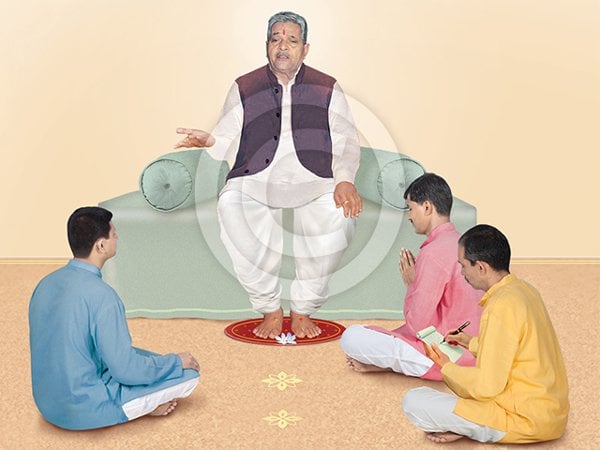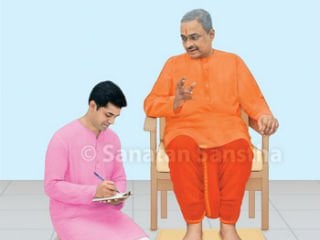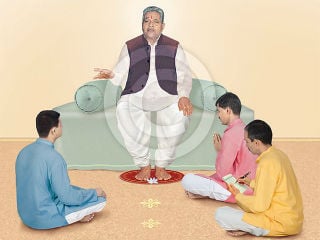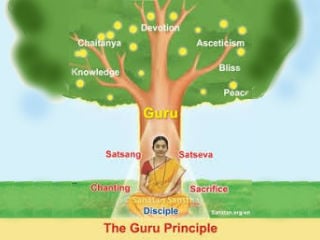The Guru cannot be considered only as a professor of teaching spirituality, because the role of a Guru is not just teaching but also helping his disciples realize God and attain self-realization. The bond which a disciple holds with his Guru is complete more at a subtle level, beyond material ties. This article will give us a peek into the pious relation of a Guru and His disciple and how He comes to the aid of his disciples when they call out to Him.
1. Taking care of the worldly needs of the disciple
1 A. Two to three years ago a disciple (J.B.A.) had told his brother, “No matter how seriously ill our parents are, if the Guru summons me at that moment, I will definitely go to Him.” Once, his mother was critically ill. She would get severe attacks of anginal pain two to three times daily. The attack would last for an hour or a half. He could do nothing but watch her helplessly. At that time on a Monday Bābā ([Sadguru His Holiness Bhaktarāj Mahārāj (Bābā) (The Guru of His Holiness Dr. Athavale)] came to Nāshik and asked J.B.A. on the phone, “When are you coming to Nāshik?” He replied, “My mother is ill.” Then Bābā rang up again on Tuesday and Wednesday to ask when he would come. Then he felt that since the Guru had asked him he had to go. How could he when his mother was ill? He was also feeling exhausted with the running around that he had to do due to her illness. He told Bābā vaguely, “I will come on Saturday or Sunday.” Upon this Bābā said, “As usual stay on from Saturday to Monday. Resume work on Tuesday.” He listened and simply said “okay”. On Thursday morning he resolved that he would definitely visit Bābā no matter what happened to his mother. At the same time his parents told him, “If the Guru has summoned you, you must go. Leave us to our fate.” On Thursday night he received Bābā’s message that He had already left Nāshik for Indore. Some wondered why Bābā suddenly left for Indore when He had also summoned some other disciples to Nāshik. He (J.B.A.) realized that Bābā must have left Nāshik to avoid keeping him (J.B.A.) in a dual state of mind worrying about his ailing mother when leaving for Nāshik and to prevent criticism from others regarding the same issue. After reaching Indore, on Friday night Bābā rang him up. So he asked Bābā, “When we were to come to Nāshik as per Your instructions, why did You leave Nāshik before our arrival?” Then Bābā replied, “You had to stay with your mother as she was ill. If I were to stay in Nāshik you would definitely come and then people would have criticized that you went to Nāshik inspite of your mother’s illness. Hence I left earlier.” About Bābā’s sudden departure from Nāshik some disciples felt, “Why does He behave so oddly? He always does this.” Most people are unable to understand that there is some major objective behind His behaviour.
1 B. On 9/2/1993 on the day of Mahāshivrātrī (the religious observance which falls on Magh Krishna Chaturdashi), Bābā said to one disciple (J.B.A.), “Although you are fully prepared to give up everything and sacrifice your life for the sake of Spirituality, since your family is not yet prepared for it and since your parents too are alive people should not say that you have left home neglecting them. Hence devote all time to Spirituality, gradually.”
2. Taking into account the disciple’s financial status
2 A. Once when Bābā was visiting Sātārā He was invited for a meal by a disciple who was not well-off. Bābā told him, “I will visit you and leave after performing Āratī for Mahārāj [(Baba’s Guru (His Holiness Anantanand Saish Maharaj)]. Do not make any arrangements for a meal”. The disciple was unable to perceive Bābā’s intention. He would not listen even after being told repeatedly. He insistently said, “It will not cause me any inconvenience if You come. I have made all arrangements for that. You must have a meal with us”. Then Bābā angrily said, “I know your financial status. I cannot come for a meal by Myself. Five to ten people will accompany Me. So one meal for Me will cost you your entire month’s salary. Then how will you manage the rest of the month? Your relatives will wonder how your Guru could do this to you inspite of knowing your financial condition. It will be a stigma on Spirituality. Your insistence is because of your ego. One should practice Spirituality according to one’s capacity. If it is Mahārāj’s prasād (Holy sacrament) that you desire then go and fetch khadīsākhar (sugar cubes) worth twenty-five paise. Distribute them to everyone and take the remaining home as the holy sacrament”. Saying thus He changed His disciple’s mind.
2 B. After guruprāpti, (being blessed by with a Guru) we used to offer Him something from time to time. Still the bhāv (Spiritual emotion) that ‘Everything belongs to the Guru. Who am I to give Him something?’ had not developed. Later with the Guru’s grace as the number of patients coming for treatment decreased our capacity to offer Bābā money too decreased. In January 1993 we offered Bābā two thousand rupees. Bābā returned the amount saying, “Actually it is I who has to give you money for preaching Spirituality.” In February 1993 Bābā came to Morchondī for Māhāshivrātrī. At that time we could not offer Him anything. On the contrary He paid for our car petrol and gave us 500 rupees. We were rather upset that instead of us offering Him money it was He who gave it to us. I narrated this to His Holiness Rāmjīdādā who in response said, “After surrendering everything to the Guru He alone should give the money.” In the same month we offered His Holiness Kāle Mahārāj some money. He too returned it. Once again we came to realize that eventually all saints are the same from within.
3. Allaying the disciple’s problems
3 A. On 3rd May 1992 Dr. Milind Khare informed Bābā that a lot of criticism on the compiler (J.B.A.) was being published in the newspapers with regard to his spiritual writings and workshops. Bābā stopped for a moment and then replied, “My Guru took care of Me for thirty-five years. Won’t I take care of My disciple?” The motto of The Lord is to be the Saviour of His devotee, He will come to protect His devout servant.
3 B. At times the Guru’s method of alleviating the disciple’s problems could be by increasing the disciple’s contact with virtuous friends whom he needs or conveniently taking away from him those people who constantly trouble him or are likely to do so in the future.
4. The Guru’s view regarding the disciple’s faults
Since the Guru is a saviour He never feels like punishing a disciple for any fault or for not doing spiritual practice. Most of the times He takes care of the disciple. The maximum punishment that He can give is by ignoring the disciple. Once a Guru ignores a disciple, all Gurus follow suit as finally there is only one Guru principle. Then the disciple’s progress itself gets hampered.
5. Fulfilling the disciple’s desire
Despite not meeting Bābā even once, the seekers attending the spiritual workshops in Mumbaī were enthusiastic about celebrating the 1992 Gurupournimā (Full moon day of the month of Āshāḍha, also called Vyās Pourṇima after Sage Vyās who is considered ādya, meaning the first Guru) in Mumbaī. One disciple (J.B.A.) strongly felt that these seekers should be able to pay their respects to Bābā atleast once before Gurupournimā. However thinking that Bābā would meet them only if He wished and not otherwise he decided not to ask Bābā anything in this regard. However he intensely hoped that Bābā would read his thoughts and fulfill his desire. Once, soon after Bābā met him He said, “Arrange for a place where I could meet all those attending the workshops”. Upon this J.B.A. asked Bābā whether He could come to the venue where all of them met for workshops on Sundays as the place there was spacious enough. Bābā instantly agreed. Actually He was supposed to leave Mumbaī on Saturday morning but He stayed behind to fulfill His disciple’s wish. Though He was running high temperature He climbed two flights of stairs to the workshop venue. Bābā who usually sings only bhajans (devotional songs) gave a one hour discourse on chanting The Lord’s Name, that day. He later explained that He did this because those attending the workshops were habituated to listening to discourses !
6. Fulfilling the worldly
expectations of a disciple having no expectations
Some wonder how the Guru guides some of His disciples in worldly matters though one is always told by the Guru that one should not ask worldly questions. The answer to this is that He does not respond to those who perform devotion only with expectation. On the contrary He guides a disciple doing spiritual practice without expectation, in his worldly life, at times on His own and otherwise if He is asked for advice by the disciple. In fact it is the very duty of the Guru to eliminate the disciple’s obstacles so that his spiritual practice occurs smoothly.
7. Giving the disciple forewarnings
If an unfavourable event is due to occur in a disciple’s life then depending on the disciple’s mental preparedness Bābā warns him about it either indirectly or directly.
8. Visiting a disciple
Whom does the Guru visit? Should the disciple visit the Guru or should the Guru visit the disciple? Why should Bābā visit someone who does not visit Him for reasons like leave not being sanctioned at the workplace, crowded trains, family problems, etc.? Bābā feels like visiting only those who visit Him despite all such obstacles. Besides when one says come over to our place the emotion that this house is mine is in the mind. The Guru does not like that. One should harbour the bhāv that ‘this is the Guru’s home. He will come whenever He wishes. The bhāv should be that ‘I am living in the Guru’s house’. If one maintains this spiritual emotion then the Guru Himself visits one without an invitation and makes Himself at home. Harbouring the spiritual emotion that ‘this is the Guru’s home’ some disciples put the name plate of the Guru instead of one’s own on the main door of the house while others inscribe the Guru’s Name on home appliances. Still others name their house or even their children after the Guru’s sansthā (organisation) instead of His Name.
9. Avoiding inconvenience to the family members
-
When Bābā visits someone, if the family members do not have anything in the house to offer the guests accompanying Him then He asks for a pinch of sugar to be given to each one.
-
If Bābā happens to visit someone especially at odd hours or late at night then He sends a messenger ahead to inform them about His arrival. This gives the family members atleast some time to clear up and prepare for His arrival.
-
If He happens to visit at odd hours then He takes provisions like food, vegetables, etc. along with Him.
-
If the host whom He is visiting, is supposed to go out for some important work then He willingly lets him go and arranges for His food Himself.
10. Eliminating the subtle ‘I’ness of the disciple
Bābā told a disciple (J.B.A.) that He would telephonically inform him whether to come to Kāndalī or Nāshik the following weekend. Till Friday evening there was no message from Bābā. During those days the telephones too were out of order. So he decided to get an answer from Bābā by way of meditation. Still he did not get an answer. So, he decided to go to Kāndali to clean up the āshram. He went to Kāndali as decided. On Sunday afternoon Bābā’s message asking him to come to Nāshik before nightfall was conveyed to him. Then he wondered whether he had committed a mistake and disobeyed Bābā by coming to Kāndali without awaiting His message. When he asked Bābā this, He said, “Who decided that you should go to Kāndali?” (Bābā had inspired him from within. Unable to perceive this he felt that he had made that decision on his own!) Bābā added further, “What is the need for a telephone to send a message? Can’t you perceive it from within?”
11. The Guru’s blessing
Bābā’s elder son Nandû had been blessed by Shrī Anantānand Sāīsh that “he would become great”. Yet even after good education, marriage and the birth of a daughter he was not financially independent. Often his wife had to stay with her parents. There were frequent quarrels between the two. His family then began to feel that Shrī Guru’s blessing was meaningless. When Bābā was asked about it He replied, “Since the Guru has blessed him he will definitely become great, that is, he will certainly progress in Spirituality alone. It is but natural for a wife to have worldly expectations. If he is asked to undertake spiritual practice now, he will immediately desert his wife for its sake. To prevent this from happening I am allowing him to do as he wishes. For the time being I am keeping him occupied with other tasks”.
12. A disciple’s illness and death
12 A. Endowing the strength to face illness: One of Bābā’s lady disciples was afflicted with a skin disease which was causing total peeling off of the skin. To prevent further progression of the disease the doctors advised her to bathe daily. As there was hardly any skin she had excruciating pain during the bath. However she was able to bear this pain by chanting the gurumantra ‘Hari Om Tatsat’. In the terminal stages of her illness her sister used to see a yellow aura around her body and the disciple would see Bābā seated on a chair.
12 B. Recommending spiritual practice even to one on the deathbed: Bābā recommends spiritual practice even to one on his deathbed so that he attains an evolved state after death.
13. The favourite disciple
13 A. Science of Spirituality describes three types of disciples – superior, medium and inferior. The superior disciple is liberated merely by darshan of (meeting) the Guru, the medium by clarifying his doubts and the inferior disciple by winning over the Guru through service. The Guru likes the one who asks questions using his intellect, more than the one who serves Him because eventually service of the causal body, that is of the intellect is far more subtle than that of the physical body.
13 B. Since eventually the Guru and God are one and the same, like God the favourite disciple of the Guru too is the one who spreads Spirituality.
14. Merging with the disciple
Once Bābā was supposed to visit a disciple (J.B.A.). A fortnight before this some Gurubrethren collected a sum of a thousand rupees to offer Bābā on His arrival. At that time this disciple was in dire need of money. He thought that he would use the money as there was still a fortnight left for Bābā’s visit. He was sure that he would be able to replace the amount by then and offer it to Bābā. So he used it. But when Bābā arrived the very next day he frankly narrated everything to Him. Bābā responded saying, “Your spending the money was correct. What is Mine is yours. It is your right to use it. It does not matter if you are unable to offer Me money later as well”.’


 The one and only Guru-disciple tradition of the Sanatan Sanstha which has proven special in...
The one and only Guru-disciple tradition of the Sanatan Sanstha which has proven special in... Who is proclaimed a Saint as per Science of Spirituality ?
Who is proclaimed a Saint as per Science of Spirituality ? Faith & Guru
Faith & Guru Who is a real Guru ?
Who is a real Guru ? The Guru Principle
The Guru Principle Offering gratitude unto the Holy feet of the Guru is true Gurudakshina !
Offering gratitude unto the Holy feet of the Guru is true Gurudakshina !